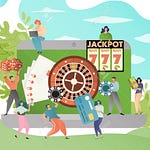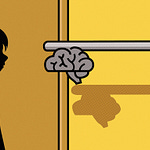You’ve been kidnapped.
That’s probably not the start to the day you were looking for. It was already going to be a long day, what with accounting all over your ass about those expense reports—Suzie needs to just lay off if you ask me—and now you have to deal with this shit?
Your kidnapper is a little different than most; he loves statistics and game theory and randomness, and he’s going to let you play a little game to determine if he’ll hold you hostage. No, the kidnapper is not me, although if I were a kidnapper, I’d let anyone free who could beat me in a best-of-101 rock-paper-scissors contest. Meaning I’d never let anyone free. Sentence fragment for dramatic effect. And another. Something you shouldn’t try unless experienced.
We’re not playing rock-paper-scissors though. The kidnapper puts three cards on a table, two of which say “MINE” and one of which says “FREE.” He knows which are which, and he tells you that you can leave if you choose the card with “FREE” on it.
Damn, a 33% chance of freedom. And even worse, a 2-in-3 chance Suzie’s week-end accounting is going to be askew. She’s already in Robert’s ear about your frequent tardiness. You stay late though, unless you have to pick up the kids, so she really just needs to back off.
“Why are you telling me all this, and who tf is Suzie?” asks the kidnapper. “Just pick a fucking card.”
You pick the first.
“Nice choice,” the kidnapper says with a laugh before turning over the middle card, which reads “MINE.”
With the first card (yours) and the third card still face-down, the kidnapper asks, “Now, would you like to switch cards?”
Think about it. Would it help to switch to the third card? You had a one-in-three chance from the start, so does it really matter which card you select or if you change your choice? Are your chances now 50% since there are just two cards remaining?
What’s your pick?
The Monty Hall Problem
This is of course my version of a puzzle you might have heard of called the Monty Hall problem, named after the host of a show called Let’s Make a Deal on which a version of the game was played.
I presume some of you have heard of the brainteaser, so I’m going to focus mostly on the implications of the answer, but the gist of the solution is this…
Your choice not only matters, but it matters a whole lot, doubling your chances of going free if you make the change. My initial reaction when I heard of this solution was sort of disbelief because it felt so counterintuitive, but it’s right.
The key component of the decision that’s easy to overlook is that the kidnapper has knowledge of the cards and, when he makes the choice to show you one of the “MINE” cards, it’s a huge piece of new information.
Let’s say the order of the cards is MINE, MINE, FREE…
The scenarios can play out in this way:
If you select the first card, the kidnapper will show you the second. If you choose to stay with your choice, you’re his. If you switch, you’re free.
If you select the second card, the kidnapper will show you the first. If you choose to stay with your choice, you’re his. If you switch, you’re free.
If you select the third card, the kidnapper can show you any other card. If you choose to stay with your choice, you’re free. If you switch, you’re his.
By changing your selection, your odds of freedom increase from 1-in-3 at the start of the game to 2-in-3. That’s due solely to the knowledge of the kidnapper and his decision to turn over one of the “MINE” cards.
Some Takeaways
I think the Monty Hall problem is a really interesting game theory and psychology puzzle that has far-reaching implications on the framework we use for certain decisions.
Difficult dilemmas often require counterintuitive solutions.
When you first encounter the Monty Hall problem, it just seems sort of obvious it doesn’t matter what you do. The solution—that it’s right to make the switch—is extremely counterintuitive.
This is the case with many psychological and game-theory-driven problems, especially. Humans are hardwired to see the world in certain ways, some of which are perhaps useful heuristics to maximize survival, but not as the most effective way to assess reality.
Things become even more complex when others get involved, and this is the aspect of decision-making many overlook; the EV of most meaningful choices cannot be properly calculated without a consideration of what other people will think and do.
And those problems like Monty Hall, whose solutions are so counterintuitive but also so obviously mathematically correct, are those worth analyzing.
You must consider what other people know that you don’t.
The keystone to the Monty Hall solution that nearly everyone overlooks is that they’re acquiring new information once one of the options is removed. If the kidnapper were selecting a card at random and he just so happened to pick “MINE,” it wouldn’t matter if you decide to change or not.
In reality, whether or not you chose “FREE” is either 0% or 100%, but our ability to predict whether or not you chose that single card changes over time.
When you pick a random card, the odds are 33%.
When the kidnapper removes one card and you stay, the odds are still 33%.
When the kidnapper removes one card and you switch, the odds are 67%.
And if the kidnapper were removing a card at random and it just so happened to be “MINE,” the odds are 50% and it wouldn’t matter if you switch cards or not.
What’s interesting here is that in the last two scenarios, the mechanics are exactly the same: three cards dealt, you pick one, the kidnapper removes one “MINE.”
What changes the percentages—what shifts our ability to predict the future and ultimately the optimal decision—is the knowledge and intentions of the kidnapper. What matters is what he knows that you don’t, and the same is true in a variety of real-life situations.
Poker pros know this well, continually making difficult decisions with new information. Baseline stats are a decent starting point, but your prior beliefs must be adjusted all the time. When someone plays tight and then check-raises out of position, the range of hands he might have needs to be narrowed, in the same way the kidnapper’s offer to remove a card gives information about where “FREE” might be located.
Similarly, if you’re in a situation in which a deal looks too good to be true and you know the other side isn’t a dummy, your first thought should be what asymmetry in information might exist that would propel them to do this; what might they know that I do not?
And again, the most interesting aspect to me that I want to hammer home is that what transpires can be exactly the same on the surface, and yet our ability to predict the card’s location changes based solely on someone else’s presumed knowledge.
The right choice in rock-paper-scissors after both picking rock on the first throw could be paper against one opponent but scissors against an opponent who doesn’t properly understand randomness. (The latter trait leads to alternating as a substitute for “randomizing,” meaning they’re less likely to throw rock, meaning you’d want to throw what loses to rock to maximize your odds of a tie or win…not that I’ve had women lose interest in seeing me after I’ve smoked their ass in rock-paper-scissors on the first date and then explained later in a text why I think they have a big leak in their post-tie strategy or anything like that…no, definitely nothing like that.)
You have to be willing to change your mind. Often.
I’ve played a version of the Monty Hall problem with friends, and almost all of them choose to stay with their original selection. You should try it with your friends; nothing brings people closer than a good old-fashioned brainteaser and the accompanying statistical explanation for why they’re an IDIOT.
Why do people stay with their original choice? When I stumbled upon the puzzle for the first time, I chose to switch cards—not for any statistical reason or because I understood the underlying game theory, but simply because it seemed fishy to me. Actually, I was also employing game theory, just with different reasoning. My thinking was:
It seems like the “obvious” choice—or at least what most would do—is stay.
I don’t believe there’s a reduction in success rate if I switch.
Thus, if I don’t see downside to switching and it seems like staying is a trick, I’ll switch.
Extending this reasoning to other situations, when you don’t see a clear difference in EV among two different options, choose the one that’s less popular. Contrarians know you can find all kinds of success when you stick by the crowd when they’re obviously right and fade them when they’re clearly wrong, but you should typically side with the less popular option when you’re unsure, too.
Part of this is due to payoffs, but part is because people stick with losing beliefs for too long. It’s just the way we’re wired. I know I’ve done it in the past. Nah, that Odell guy who barely scored at LSU isn’t going to do well in his rookie season. Guys, it was just a lucky start. His quarterback is Eli Manning. Okay, he’s doing well so far, but it’s just variance. Eh, only seven touchdowns in four games. Yeah, okay, but will he even lead the league in yards per game? Oh shit, I’m broke.
We’re bombarded with so much new information all the time, and most decisions are pretty close calls from the start, that if you aren’t regularly changing your opinions—even contradicting your past self—then you’re being stubborn (and wrong).
As an example, sports bettors are tasked with assessing a team’s chances of winning a game at any given point in time and comparing their prediction to the odds being offered. But our best guess of a team’s chances of winning should be changing all the time with new information, just as our best guess of our chances of going free or being kidnapped also change with new information. If you make a bet in the beginning of the day, you should at least be willing to bet against yourself later in the day if the odds warrant it; betting on both teams at, say, -105 locks in a loss (assuming the same bet size), but both could be smart bets if their “true odds” at the time of each were, say, -120.
The point is that “flip-flopping” is bad if it results from indecisiveness, but not in regards to changing your mind when the evidence dictates it. Sometimes—many times—that will result in contradicting your prior self. And that’s okay!
So much of investing, business, and life success is not about making huge gains, but removing big leaks that can lead to disastrous losses, and the most surefire path to the latter is being stubborn in your views.
Changing your mind isn’t a sign of weakness. Actually, it’s quite the opposite, as the strongest, most confident people are able to admit fault, shift gears, and move forward with conviction no matter how others perceive it.
Take hypothetical scenarios to their logical extreme.
In How to Learn Anything ASAP, I proposed that the most effective strategy for quick problem-solving is to take a problem to its logical extreme, then work backwards from there.
My buddy Joe Ingram is a former poker pro. One of the tactics he employed while learning the game was to form hypotheses about what sorts of strategies he thought were underutilized—three-betting in certain spots, for example—and take them to their logical extreme by employing them 100% of the time. That might sound outrageous, but in doing that, he was able to quickly acquire really valuable information about which theories were astute, slowly adjusting the percentage downward—it was the only direction to go, after all—until he hit the GTO (game-theory optimal) position, a.k.a. the Nash equilibrium, at which earnings were maximized.
In the case of the kidnapper, it’s easy to overlook the solution because the numbers are relatively small. But what if there were 100 cards on the table? You choose one, then the kidnapper removes 98 of the cards, leaving yours and one other. Do you want to switch now? You had a 1% chance of picking correctly when the game started, but now a 99% chance of winning if you switch.
Figure out what type of game you’re playing.
The key to winning anything is figuring out what game is really being played—the hidden rules. Are you playing a game with no opponents in which others’ beliefs and actions don’t affect yours, such as learning a new language? Are you playing a solved game in which there are clear optimal solutions, like Connect Four? Are you playing a game with a strategy that changes dramatically based on how others act, like poker or participating in markets?
There are many situations in which what’s “optimal” is only so before adjusting for others’ actions. In the case of the kidnapper, you can only choose the right strategy after realizing the game you’re playing is one of pure statistics/randomness at the start that transforms into one of game theory.
More often than not, the “game” you’re playing—even if it’s finding the most efficient route home—is one of game theory more than people understand. An easy way to determine the extent of this is to ask yourself, if everyone believed something to be true except me, and I were right, would I benefit more from being on an island? When it comes to deciding between two different roads home, for example, you’d clearly benefit if everyone else took the opposite route.
In such situations, think about value in terms of what you believe it to be in a vacuum minus what others think. Finding an edge in this battle of wits is of course tied to your ability to predict what others will do, which is why I believe it’s so vital to understand public psychology—the cognitive biases from which you and others inevitably suffer and the ways in which our minds naturally lead us astray.
But that’s for another day. Right now, I have to go play a best-of-101 rock-paper-scissors match.















Share this post